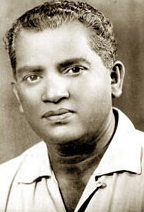
Charles Henry de Soysa Dharmagunawardana Vipula Jayasuriya Karunaratna Disanayaka popularly known as Charles Henry de Soysa,JP was a Ceylonese entrepreneur and philanthropist. He was a pioneering planter,industrialist and was the wealthiest Ceylonese of the 19th century. He was instrumental in the establishment of the first Ceylonese bank,the Moratuwa carpenters guild,the Ceylon Agricultural and National Associations. He is widely regarded as the greatest philanthropist of the island for contributions which includes the De Soysa Maternity Hospital,the Prince and Princess of Wales Colleges,the Model Farm Experimental Station and many other institutions and acts of charity,establishing infant-maternal healthcare and secular education for girls in the country. He would have been the island's first Knight Bachelor,but having died prior,his widow was given the rare honor of the use of the style and dignity of wife of the Knight Bachelor and was known as Catherine,Lady de Soysa.

Sir James Peiris was a prominent leader in the Sri Lankan independence movement,the first elected Vice-President of the Legislative Council of Ceylon and the first native Governor of Ceylon (Acting).
Justin Kotelawala,CBE,JP was a Sri Lankan businessman and senator. He was the former chairman of the Ceylinco Group.

Herbert Sri Nissanka,QC was a Ceylonese lawyer and legislator. Elected to the first post-independence parliament,he was one of the founding members of the Sri Lanka Freedom Party.

Alexander Ekanayake Gunasinha was a Sri Lankan trade unionist and politician. A pioneering trade union leader,known as the "Father of the Labour Movement",he was the founder of the Ceylon Labour Party,Sri Lanka's first labour organisation. A former mayor of Colombo,he served as the Minister without portfolio,Minister of State and Chief Government Whip in the First Parliament of Sri Lanka and Ceylon's Ambassador to Burma and Indonesia.
Reginald Abraham de Mel was a Ceylonese politician. Having served as the Mayor of Colombo,he served as the Deputy Speaker and Chairman of Committees in the first parliament of Ceylon,until he was unseated by an election petition.
Iruthayanathan Charles Nirmalanathan is a Sri Lankan Tamil politician and Member of Parliament.
The Ceylon Labour Party (CLP) was a political party in Sri Lanka.

The 1st State Council of Ceylon was a meeting of the State Council of Ceylon,with the membership determined by the results of the 1931 state council election held between 13 and 20 June 1931. The parliament met for the first time on 7 July 1931 and was dissolved on 7 December 1935.

Don Benjamin Rupasinghe Gunawardena,popularly as Robert Gunawardena,was a Sri Lankan Marxist politician and diplomat. He was one of the founders of the Lanka Sama Samaja Party,which was the first political party in Sri Lanka,and served as the long time MP for Kotte. He was the leader of the Suriya-Mal Movement and served as ambassador to China between 1965 and 1970.

The 2nd State Council of Ceylon was a meeting of the State Council of Ceylon,with the membership determined by the results of the 1936 state council election held between 22 February and 7 March 1936. The parliament met for the first time on 17 March 1936 and was dissolved on 4 July 1947.
Clement Johnston Black was a Chartered Accountant and a member of the 1st and 2nd State Councils of Ceylon.
Richard Charles Kannangara was a Ceylonese tea plantation owner and politician.

Dewan Bahadur Chevalier Ignatius Xavier Pereira was a colonial-era Ceylonese businessman and politician.
Evelyn Charles Arthur Villiers JP UPM was a British planter and politician in colonial Ceylon.
Colonel Oswald Boyd Forbes was a tea-broker,military officer and politician in Colonial Ceylon.
Dr Hector Hieronymus Fernando was a Ceylonese Marxist politician.
Kusala Vichitra Abhayavardhana was a Sri Lankan social worker. She was the co-founder of the Civil Service International in Sri Lanka,founding secretary International Women’s Year Sri Lanka and national chair of the Women in Peace in Sri Lanka. She was a Member of Parliament from 1970 to 1977.
Kachchakaduge Nalin Ruwanjeewa Fernando is a Sri Lankan politician and a former Member of Parliament.







